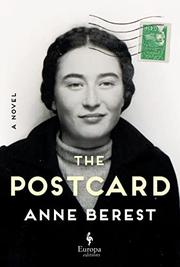

THE POSTCARD
by Anne Berest ; translated by Tina Kover
A Jewish family’s experience across multiple generations, researched by a mother and daughter, shines a spotlight on French antisemitism, both historic and contemporary.
The arrival in 2003 of an unsigned postcard, delivered to her mother Lélia’s postbox in Paris, bearing the names of four family ancestors murdered at Auschwitz, forces Anne Berest properly to consider her Jewish heritage. The result is this autofiction sharing the tragic saga of one branch of her forbears, the Rabinovitches, seeking peace and a safe home in the shifting European landscape of the 20th century. Lélia, who has methodically pieced together the story of her grandparents, now shares it with Anne, starting with Ephraïm and Emma’s marriage in Moscow and the birth of their first child, Myriam, Lélia’s mother, who will be the sole survivor. Two more children, Noémie and Jacques, are born, while the Rabinovitches move, for political reasons, to Latvia, then France. But Ephraïm fails to secure French citizenship for the family, and, as their lives become increasingly circumscribed after the German occupation, first Noémie and Jacques and then the parents are arrested, imprisoned, and slaughtered. Berest’s descriptions of captivity are notably horrific. Years later, as Anne’s child reports antisemitism at school, Anne remembers the postcard and begins a quest to find its author. Now the narrative switches from historical record to detection, involving a private eye and a graphologist, before turning more introspective as it traces Myriam’s experience. Having escaped into the French free zone with her husband, she settles in a remote Provencal cottage, then comes back to Paris and joins the Resistance. As the war ends, she witnesses the return of skeletal survivors from Germany. The story overall is poignant, tense, restless, and ultimately pivotal, as Anne not only solves her mystery, but, more importantly, gains her identity.
The anguish and horror of genocide arrive with fresh impact in an absorbing personal account.